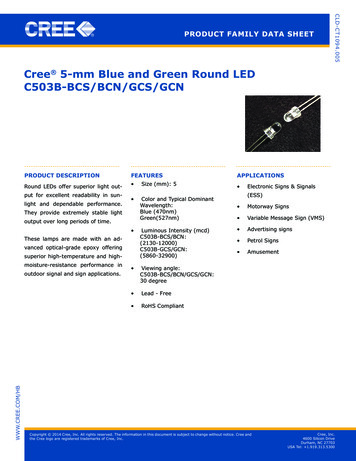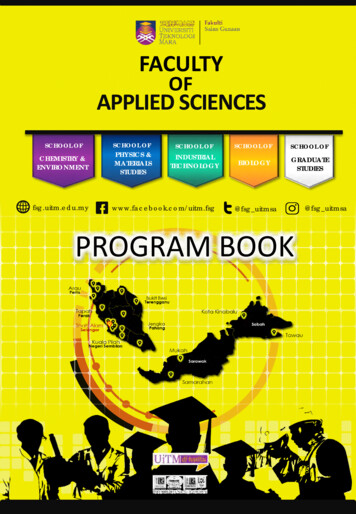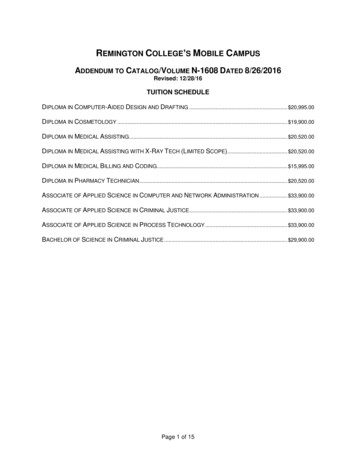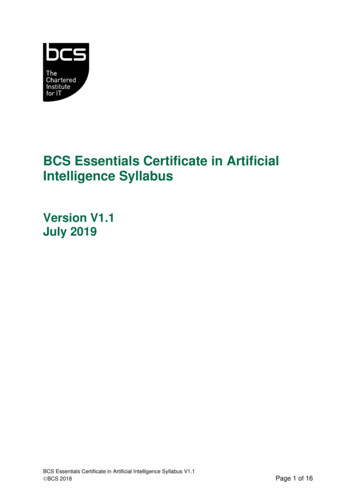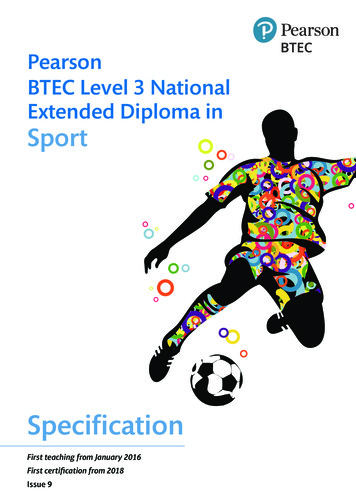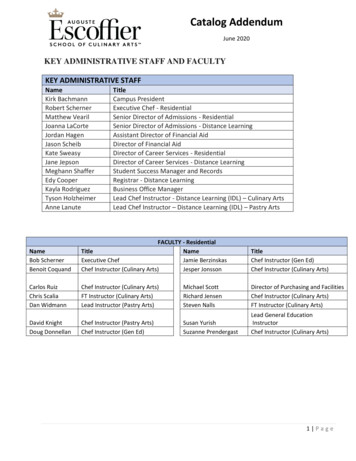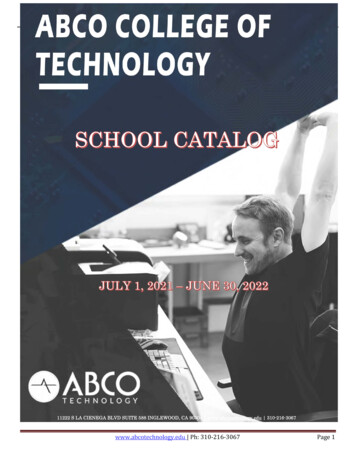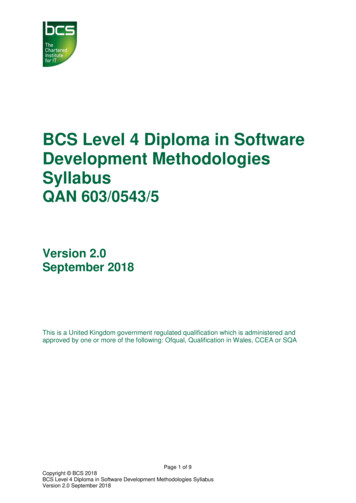
Transcription
BCS Level 4 Diploma in SoftwareDevelopment MethodologiesSyllabusQAN 603/0543/5Version 2.0September 2018This is a United Kingdom government regulated qualification which is administered andapproved by one or more of the following: Ofqual, Qualification in Wales, CCEA or SQAPage 1 of 9Copyright BCS 2018BCS Level 4 Diploma in Software Development Methodologies SyllabusVersion 2.0 September 2018
BCS Level 4 Diploma in Software DevelopmentMethodologies SyllabusIntroduction . 4Objectives . 4Course Format and Duration . 4Eligibility for the Examination . 4Format and Duration of the Examination . 4Additional time for Apprentices requiring Reasonable Adjustments due to a disability . 5Additional time for Apprentices whose language is not the language of the examination . 5Guidelines for Training Providers . 5Syllabus . 6Levels of Knowledge / SFIA Levels . 7Question Weighting . 7Format of Examination . 8Trainer Criteria . 8Classroom Size . 8Recommended Reading List . 8Page 2 of 9Copyright BCS 2018BCS Level 4 Diploma in Software Development Methodologies SyllabusVersion 2.0 September 2018
Change HistoryAny changes made to the syllabus shall be clearly documented with a change history log.This shall include the latest version number, date of the amendment and changes made. Thepurpose is to identify quickly what changes have been made.Version NumberChanges MadeVersion 1.0 July2016Version 1.1September 2016Version 1.1September 2016Version 2.0September 2018Syllabus CreatedSyllabus CreatedSyllabus updated to include QANDocument amended to reflect updates made during syllabusenhancement.Page 3 of 9Copyright BCS 2018BCS Level 4 Diploma in Software Development Methodologies SyllabusVersion 2.0 September 2018
IntroductionThis Diploma is the first module of the two knowledge modules required for the Level 4Software Developer Apprenticeship. It covers the range of concepts, approaches andtechniques that are applicable to Software Development Methodologies, for whichApprentices are required to demonstrate their knowledge and understanding.ObjectivesApprentices should be able to demonstrate knowledge and understanding of SoftwareDevelopment Methodologies, its theory and techniques. Key areas are:1. Understand and operate at all stages of the software development lifecycle.2. Understand the similarities and differences (taking into account the positives andnegatives of both approaches) between agile and waterfall software developmentmethodologies.3. Understand how teams work effectively to produce software and contributeappropriately.Evidence of lessons learnt in these key areas should be collected and reflected upon whenthe Apprentice is compiling the Summative Portfolio as the Apprentice could identify how thetask might be done better/differently with knowledge subsequently gained.Target AudienceThe Diploma is relevant to anyone enrolled on the Level 4 Software DeveloperApprenticeship Programme.Course Format and DurationCandidates can study for this Diploma by attending a training course provided by a BCSaccredited Training Provider. The estimated total qualification time for this Diploma is 401hours.Eligibility for the ExaminationThere are no specific pre-requisites for entry to the examination; however, candidates shouldpossess the appropriate level of knowledge to fulfil the objective shown above.Format and Duration of the ExaminationThe format for the examination is a one-hour multiple-choice examination consisting of 40questions. The examination is closed book (no materials can be taken into the examinationroom). The pass mark is 26/40 (65%).Page 4 of 9Copyright BCS 2018BCS Level 4 Diploma in Software Development Methodologies SyllabusVersion 2.0 September 2018
Additional time for Apprentices requiring ReasonableAdjustments due to a disabilityApprentices may request additional time if they require reasonable adjustments. Pleaserefer to the reasonable adjustments policy for detailed information on how and when toapply.Additional time for Apprentices whose language is notthe language of the examinationIf the examination is taken in a language that is not the Apprentice’s native/official language,then they are entitled to 25% extra time.If the examination is taken in a language that is not the Apprentice’s native/official language,then they are entitled to use their own paper language dictionary (whose purpose istranslation between the examination language and another national language) during theexamination. Electronic versions of dictionaries will not be allowed into the examinationroom.Guidelines for Training ProvidersEach major subject heading in this syllabus is assigned an allocated time. The purpose ofthis is two-fold: first, to give both guidance on the relative proportion of time to be allocated toeach section of an accredited course and an approximate minimum time for the teaching ofeach section; second, to guide the proportion of questions in the exam. Training Providersmay spend more time than is indicated and Apprentices may spend more time again inreading and research. Courses do not have to follow the same order as the syllabus.Courses may be run as a single module or broken down into two or three smaller modules.This syllabus is structured into sections relating to major subject headings and numberedwith a single digit section number. Each section is allocated a minimum contact time forpresentation. Apprentices should be encouraged to consider their Summative Portfoliothroughout the modules.Excerpts from BCS BooksAccredited Training Organisations may include excerpts from BCS books in the coursematerials. If you wish to use excerpts from the books you will need a license from BCS to dothis. If you are interested in taking out a licence to use BCS published material, you shouldcontact the Head of Publishing at BCS outlining the material you wish to copy and the use towhich it will be put.Page 5 of 9Copyright BCS 2018BCS Level 4 Diploma in Software Development Methodologies SyllabusVersion 2.0 September 2018
SyllabusFor each top-level area of the syllabus a percentage and K level is identified. Thepercentage is the exam coverage of that area, and the K level identifies the maximum levelof knowledge that may be examined for that area.1.Life Cycle Concepts (50%, K3)1.1Explain the role and function of the software development lifecycle (SDLC).1.2Relate the seven generic stages of the software development lifecycle (SDLC). Feasibility Study Requirements Analysis Design Code Development Testing Deployment / Implementation Maintenance1.3Show the main activities in each stage of the software development lifecycle.1.4Demonstrate the high-level deliverables from each stage of the software developmentlifecycle.2. Software Development Methodologies (20%, K3)2.1Describe the primary differences between the waterfall and agile software developmentmethods.2.2Explain the respective strengths and weaknesses of each of the waterfall and agilesoftware development methods.2.3Explain the respective strengths and weaknesses for using either the waterfall or agilesoftware development method in a given case.3. Data Roles and Responsibilities (30%, K3)3.1Relate the roles and responsibilities within software development and implementation.3.2Explain the structure of a software development team within an organisation.3.3Explain the team-working aspects that are needed to ensure effective delivery ofprojects.Page 6 of 9Copyright BCS 2018BCS Level 4 Diploma in Software Development Methodologies SyllabusVersion 2.0 September 2018
Levels of Knowledge / SFIA LevelsThis syllabus will provide Apprentices with the levels of difficulty / knowledge skill highlightedwithin the following table, enabling them to develop the skills to operate at the levels ofresponsibility indicated. The levels of knowledge and SFIA levels are explained on thewebsite www.bcs.org/levels. The levels of knowledge above will enable Apprentices todevelop the following levels of skill to be able to operate at the following levels ofresponsibility (as defined within the SFIA framework) within their workplace:LevelK7K6K5K4K3K2K1Levels of KnowledgeLevels of Skill and Responsibility mberSet strategy, inspire and mobiliseInitiate and influenceEnsure and adviseEnableApplyAssistFollowQuestion WeightingSyllabus Area1. Life Cycle of Systems Development Concepts2. Software Development Methodologies3. Data Roles and ResponsibilitiesTotalPage 7 of 9Copyright BCS 2018BCS Level 4 Diploma in Software Development Methodologies SyllabusVersion 2.0 September 2018Target number of questions2081240 Questions
Format of ExaminationType40 Question Multiple Choice.Duration1 Hour. An additional 15 minutes will be allowed for Apprentices sittingthe examination in a language that is not their native /mother tongue.Training from a BCS accredited Training Provider is stronglyrecommended but is not a pre-requisite.Pre-requisitesSupervisedYes.Open BookNo.Pass Mark26/40 (65%).CalculatorsCalculators cannot be used during this examination.Total QualificationTime (TQT)401 Hours.DeliveryOnline.Trainer CriteriaCriteria Have 10 days training experience or have a Train the Trainerqualification.Have a minimum of 3 years practical experience in the subjectarea.Classroom SizeTrainer to Apprentice ratio1:16Recommended Reading ListPrimary Text:TitleAuthorsPublisherPublication DateISBNDeveloping Information Systems: Practical guidance for IT professionalsCadle J. (Editor)BCS Learning & Development20149781780172453Page 8 of 9Copyright BCS 2018BCS Level 4 Diploma in Software Development Methodologies SyllabusVersion 2.0 September 2018
Supporting Text:TitleAuthorsPublisherPublication DateISBNSoftware Engineering for Students: A Programming ApproachBell, D.Addison Wesley (4th Edition)2005978-0321261274Indicative Programming Texts:TitleAuthorsPublisherPublication DateISBNData Structures and Algorithms in JavaGoodrich, Michael, and Tamassia, R.John Wiley and Sons, 6th ication DateASINJava Concepts 6/E for Java 7 and 8 International Student VersionHorstmann, ation DateISBNP Java How to ProgramDeitel, P. and Deitel H.Pearson (8th lication DateISBNProblem solving with C Savitch, W.Pearson (7th lication DateISBNC How to ProgramDeitel, P. and Deitel H.Prentice tion DateISBNData Structure and Algorithms Using Visual Basic.NETMcMillan, M.Cambridge University ation DateISBNIntroduction to Programming Using Visual Basic 2008Schneider, D. I.Pearson (7th Edition)2009978-0138149437Page 9 of 9Copyright BCS 2018BCS Level 4 Diploma in Software Development Methodologies SyllabusVersion 2.0 September 2018
1.3 Show the main activities in each stage of the software development lifecycle. 1.4 Demonstrate the high-level deliverables from each stage of the software development lifecycle. 2. Software Development Methodologies (20%, K3) 2.1 Describe the primary differences between the waterfall and agile software development methods.

